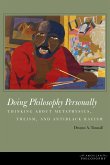First published in 1847, Works of Love is among Søren Kierkegaard's most explicitly religious works. Intended to awaken rather than convince-to replicate "the stinging, impatient character of a 'gadfly,'" as translator Bruce H. Kirmmse writes-the book consists of a series of fifteen deliberations on love. Contrasting romantic love and love for one's friends with the selfless Christian love-agape-of the New Testament, Works of Love contends that the only way to purge self-interest from love is to love one's neighbor, who is "indeed unconditionally every person." Though always careful to distinguish his "deliberations" from clerical "sermons," Kierkegaard insisted that in order to grasp the full meaning of the work, one must hear it. Whereas other translations have obscured or disregarded the rhetorical aspect of the text, Kirmmse's translation preserves it-thus making the same request of its readers that Kierkegaard once made of his: to hear the argument by reading it aloud.
Hinweis: Dieser Artikel kann nur an eine deutsche Lieferadresse ausgeliefert werden.
Hinweis: Dieser Artikel kann nur an eine deutsche Lieferadresse ausgeliefert werden.








